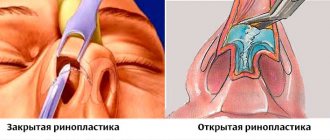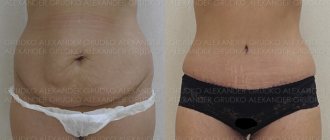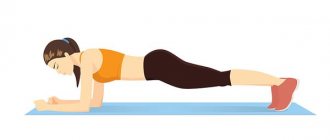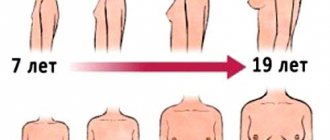Beautiful female belly with a hollow in the middle
Diastasis (from Greek diastosis) is separation, stretching, thinning, interval. We will talk about the divergence of the linea alba, which connects the rectus abdominis muscles.
The linea alba is not a muscle
. This is connective tissue, which consists of dense collagen and elastic fibers.
Normal (left) and overstretched linea alba
Normally, in women and men, the width of the white line is 0.5 - 3 cm. Anything more is classified as diastasis of the rectus abdominis muscles, that is, an increase in the distance between the left and right rectus muscles.
The divergence of the rectus abdominis muscles is essentially reminiscent of a seam on clothing. If the seams separate, the parts no longer fit tightly together. The same thing happens to the linea alba when the collagen stretches.
Contrary to claims about the benefits of exercise, diastasis does not go away on its own. Only surgery can help cope with this condition.
We at Platinental eliminate diastasis using a unique technique that has no analogues in Russian surgical practice.
What is the difference?
- We perform surgical treatment of diastasis of the rectus abdominis muscles without incisions, using endoscopic access,
- if it is necessary to remove excess skin, we perform the procedure through a small 4-centimeter incision below the bikini line; carefully mask the seam,
- we form a beautiful and flat stomach with abs; We emphasize the female belly with a small vertical hollow in the middle.
- We know how to bypass the temporary difficulty in breathing that is typical for such operations, and thereby speed up the recovery period.
From this article you will learn how to independently understand whether there is diastasis of the white line of the abdomen, why diastasis is dangerous and why it cannot be cured at home.
First, we will talk about diastasis itself and the health risks associated with it. Then we will introduce you to the latest surgical practices for suturing diastasis of the rectus abdominis muscles and its aesthetic correction.
Reliable signs of diastasis
Diastasis has one peculiarity. Even if you have a pumped-up and flat stomach, literally half a mug of water radically changes the situation, and your stomach looks like it would if someone was never friendly with sports. The anterior abdominal wall protrudes, the navel falls out.
The appearance of the abdomen is determined by the location and degree of diastasis: in some it manifests itself as a “bloated” abdomen, in others – an inverted navel.
Diastasis is dangerous due to its consequences
Usually people come to surgeons with a complaint about an unsightly “pregnant” or “beer” belly. But diastasis is dangerous not because of aesthetics, but because of its health consequences.
Sooner or later, diastasis will be joined by an abdominal hernia, when fat or a small fragment of intestine comes out between the stretched fibers of the linea alba. A hernia is formed if you torment yourself with loads and intense training: pumping up your abs, doing squats, lifting weights.
A hernia with diastasis is a time bomb that carries the risk of strangulation and necrosis. Any necrosis is treated by emergency removal of the strangulated area, and in the case of the intestines causes lifelong problems.
The mechanism of formation of abdominal hernia.
A second pregnancy with diastasis of the abdominal muscles carries the risk of oxygen starvation in the child and weak labor.
The disease manifests itself not only externally. Due to changes in the anatomy of the abdominal cavity, organs are displaced and their activity is disrupted. Therefore, the presence of diastasis is usually accompanied by numerous digestive disorders from the intestines - spasms, lower back pain, bloating, flatulence, constipation, a feeling of fullness in the abdomen. Over time, these symptoms intensify and include urinary incontinence.
Why is divergence dangerous?
The most striking consequences of diastasis are a bulging belly and a change in its configuration and overall figure. Symptoms become most pronounced 2-3 months after delivery. In an attempt to regain their previous shape, women take up active physical exercise. But the problem remains and even becomes more serious and pronounced. Diastasis is far from just an aesthetic problem. When the integrity of the abdominal wall is violated, caused by the divergence of the rectus muscles, typical complaints arise: pain in the lumbar area, disorder of venous blood flow in the pelvis, congestion in the veins of the legs and thighs, which contributes to the development of varicose veins and the threat of thrombosis. This is also one of the reasons for the prolapse of internal organs, which is a predisposing factor and the cause of urinary incontinence and frequent cystitis (inflammation of the bladder).
Problems with the digestive tract are also common - chronic constipation, dyspeptic disorders: pain or discomfort, a feeling of rapid satiety, stomach turmoil, nausea, even vomiting, belching and heartburn.
The best treatment for diastasis and its complications is prevention, because it is possible to reduce its likelihood. The main thing is to strengthen the muscles even at the stage of pregnancy planning. Then even the formed problem will go away on its own and painlessly.
How to determine abdominal diastasis yourself
To check your stomach yourself and recognize diastasis, you need to lie on a flat surface and bend your knees. Place one hand behind your head. Then as you exhale
lift your upper body as if doing abs. This makes it easier to detect the boundaries of the rectus abdominis muscles. With your other hand, feel the middle of your stomach, between the abdominal muscles. Diastasis is felt especially well in the navel area, since anatomically the white line of the abdomen is wider in this place.
And don’t be alarmed when you find a discrepancy - if the distance between the muscles does not exceed 3 centimeters, everything is fine. More means you need to schedule an appointment with your surgeon. You decide for yourself whether to have surgery or not, but it is necessary to make a diagnosis.
On the left is diastasis of the white line of the abdomen, on the right is a normal, healthy abdomen.
How to remove diastasis without surgery? Will exercise help with abdominal muscle diastasis?
If more than 6 months have passed since birth, it is impossible to remove the belly with diastasis without surgical intervention. Neither the plank, nor the vacuum, nor massage will reduce it. No matter what you do, this condition will not go away on its own, and will only get worse over time.
Expert comment:
“Exercise does not help eliminate diastasis. Sports train muscles; the connective tissue of the white line of the abdomen is not a muscle.
However, uniform and moderate tension of the white line of the abdomen during exercise contributes to a slight renewal of connective tissue and its reduction. But not so significant as to “close” the diastasis. But intense workouts have the opposite effect - they increase intra-abdominal pressure, which continues to stretch the linea alba even more.
It is strictly forbidden to do strength exercises with diastasis of the rectus abdominis muscles after cesarean section. In this case, there is also the risk of seams coming apart.”
Vladislava Gladysheva, plastic surgeon.
Does diastasis occur in men?
Often, the discrepancy of the abdominal muscles in men is caused by excessive physical activity or, conversely, the lack thereof.
In the first case, overload leads to an increase in intra-abdominal pressure. In the second - to weakness of the abdominal muscles, due to which they cease to “hold” the internal organs, the white line experiences increased tension and gradually stretches.
Excess weight and the so-called “beer belly” lead to the development of diastasis of the rectus abdominis muscles in men. This is why the tummy does not go away even after lifestyle changes and total weight loss: an overstretched linea alba does not allow the abdominal muscles to hold the internal organs.
Treatment of abdominal muscle diastasis in men requires surgical suturing of the defect.
Physical therapy methods
The main task of physical therapy (physical therapy) is to activate the transverse muscles of the abdomen, as well as the pelvic floor and diaphragm, this helps to normalize intra-abdominal pressure, thereby eliminating the main provoking factor. In many cases, exercise therapy is preceded by osteopathic treatment. It creates a foundation, a frame for further work, “softens” the body, facilitating further work with the help of therapeutic exercises. Physical therapy is certainly important and useful, but with diastasis, not all exercises are allowed. Some of them may be dangerous and cause harm, that is, aggravate the situation.
Exercise therapy and a set of gymnastic activities must be pre-approved by a doctor and carried out under his supervision; only a doctor can give the correct and safe load to the muscles.
There are exercises that are strictly prohibited in case of discrepancy: • exercises with a fitball while lying on your back; • some yoga asanas that involve working the abdominal muscles; • abdominal exercises, torso twists; • exercises with lifting weights are strictly prohibited, and in everyday life you should not lift a load weighing more than 4-5 kg. Therapeutic gymnastics is carried out according to an algorithm and has several goals: • the first stage of treatment is preparatory, its main task is to prepare the muscles for further work with them, which can last up to 2 months; • strengthening and training the transverse muscle ensures the maintenance of internal organs in the correct position, which can be considered as the prevention of numerous diseases and conditions. The recommended set of exercises should be performed regularly and on an ongoing basis. A diagnostic test is required once a week to evaluate the results of treatment.
Conservative treatment is a long and complex work, so you should not expect instant results. But the main advantage is the ability to avoid surgical intervention and minimize the consequences.
Diastasis during pregnancy
Diastasis of the rectus abdominis muscles after childbirth develops for several reasons.
On the one hand, during pregnancy the pregnant uterus presses on the linea alba from the inside. On the other hand, the female body is preparing for childbirth. It produces special hormones that increase tissue elasticity. But as a side effect, we observe softening and divergence of the white line of the abdomen.
An effective way to prevent diastasis during pregnancy is sports. The only condition: you need to start doing exercises at least a year before pregnancy, so that the muscles of the anterior abdominal wall have time to get stronger and prevent the white line of the abdomen from spreading. It is necessary to pay attention to physical exercises during pregnancy - naturally, if the condition allows.
To prevent diastasis during pregnancy, many women use a bandage as a preventative measure. It cannot be said that it will 100% avoid problems, but it will relieve the load on the anterior abdominal wall. The main thing is to choose the right size, only after consulting a doctor, and wear it for no more than 3-4 hours at a time.
However, diastasis of the abdominal muscles after the first pregnancy is observed much less frequently than after the second. Therefore, planning a second child needs to be approached especially thoroughly.
Correction of nutrition and lifestyle
Nutrition should always be varied and meet the needs for nutrients, vitamins and minerals, regardless of health status. But with diastasis, it is necessary to avoid foods that contribute to gas formation and flatulence (legumes, cabbage, large amounts of sweets, etc.).
The basis of the diet should be products that stimulate normal intestinal function: dairy and fermented milk containing fiber, fresh fruits and vegetables. If you follow the recommendations, the risk of diastasis is 40% lower.
Sleeping position also matters. For diastasis, sleeping on your side or back is considered the most optimal. The habit of sleeping on your stomach must be abandoned. The fact is that it increases the load on the linea alba, causing the muscles to be subject to additional stretching. It is recommended to get out of bed in the morning from a position on your side, and the main muscle load should be distributed specifically to the leg muscles.
Changes in posture that occur during pregnancy aggravate the discrepancy of the abdominal muscles, so the effect must be complex. It is important to act quickly so that a vicious circle does not form: diastasis worsens posture, and posture worsens diastasis.
True and false abdominal diastasis after childbirth
Not every pregnancy requires treatment for abdominal diastasis after childbirth. Take your time immediately after giving birth to look for signs of diastasis and make a diagnosis for yourself.
After childbirth, the body is still focused on recovery. Everything that is softened and stretched tends to contract, and the stomach gradually returns to normal. Therefore, it is premature to suspect muscle diastasis immediately after the birth of a child. The body comes to its senses gradually, and it is quite possible that a soft stomach is a temporary phenomenon that will pass on its own.
It makes sense to help yourself avoid diastasis of the abdominal muscles after childbirth with the help of a corset and a fitness instructor. And don't delay! Only in the first months after childbirth can you do without surgery and significantly reduce the initial stages of diastasis.
A year after giving birth it will be too late, and no home methods will give results.
Kinesio taping
Tapes applied to the abdomen according to a special pattern are an effective method of treatment, which, in addition to other methods, allows you to get results faster. Kinesio taping of the abdomen allows you to achieve the following effects: • stabilize muscles; • relieve unpleasant and even painful sensations; • eliminate hyperextension and prevent its progression; • provide the muscles with the necessary tone; • stimulate metabolic processes.
To achieve maximum effect, tapes must be installed by a specialist according to the scheme. But the therapeutic effect is achieved only with a combination of taping and therapeutic exercises lasting several months.
Surgery for diastasis of the rectus abdominis muscles
An incision cannot be avoided if hernioplasty is necessary - surgery to remove diastasis and umbilical hernia, or abdominoplasty - removal of excess skin.
To carry out this procedure, we make a very small incision of 4-5 centimeters in the lower abdomen below the bikini line. It gives the surgeon freedom not only to remove hernias, but also to create a beautiful abdomen.
Expert comment:
“Despite the presence of a stitch, this is a very rewarding operation.
It allows not only crosslinking of diastase. This technique allows you to perform aesthetic abdominoplasty - remove excess skin, perform laser liposuction and remove fat, eliminate sagging abdomen and stretch marks, make the stomach flat, change the shape and position of the navel, emphasize the abdominal muscles and create the relief of a sports abdomen.
During the operation, I can create a sexy cleavage from the sternum to the navel, which looks very feminine. Or you can put special sutures on excessively wide muscles, limit the amplitude of their movement and form a pronounced waist.
The fat obtained during liposuction can be used as part of the same operation for liposculpture of the buttocks.
I make the cut in such a way that the seam can be covered with the smallest bikini. A special suturing technique reduces the time of surgery and rehabilitation, and makes scars and scratches almost invisible.”
Vladislava Gladysheva, plastic surgeon.
Typically, tummy tuck leads to breathing difficulties: the diastasis is stitched, and a feeling of a narrow corset appears in the abdominal area.
Over time, the body gets used to this condition, but the lack of oxygen affects both the general condition and recovery time. This is called compartment syndrome, or compartment syndrome. Before the operation, we carry out special, easy preparation, which almost completely eliminates the occurrence of compartment syndrome and ensures a quick and comfortable recovery after the procedure.
After operation
Rehabilitation after suturing of diastasis depends on the volume of intervention and requires from 1 to 4 weeks. You will need to wear surgical underwear for a month.
Endoscopic surgery involves discharge the next day.
After abdominal surgery, you need to spend a day in the hospital. You can get up and walk on the day of surgery. The stitches are removed on the 8th day. After 14 days, physical activity is allowed. After a month, you can return to your normal lifestyle.
Suturing of diastasis recti in 99% of people lasts a lifetime. The operation is not a contraindication to planning a pregnancy.
Diastase norm for children and adults
The diastase index varies depending on the age of the person. For men and women, the concentration of this enzyme makes no difference, it is the same.
The standards should be:
- for newborns, a fluctuation within 8 units/l is considered;
- in children from one year to 10 years, the normal level of diastase is approximately 30 units/l;
- the age period from 10 to 18 years should have an enzyme concentration in the blood of no more than 40 units/l;
- in elderly people under 70 years of age, the diastase index should be 125 U/L;
- for people over 70, the normal level is approximately 160 units/l.
An increase and decrease in the diastase index in the blood indicates pathological changes in digestion.











